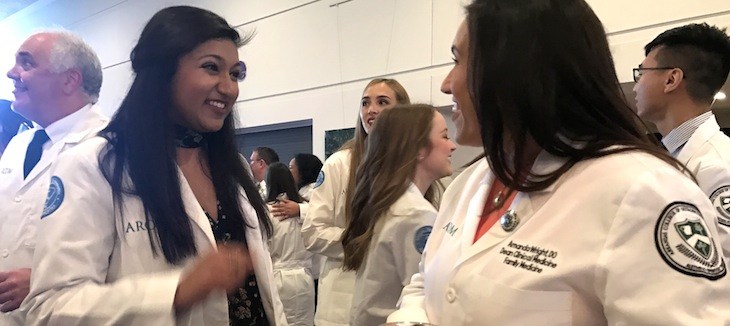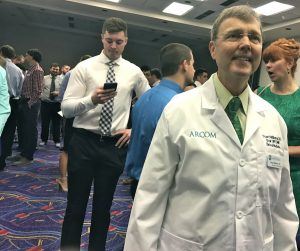‘White coat’ ceremony marks transition for Arkansas College of Osteopathic Medicine students
by September 16, 2017 2:50 pm 3,713 views

(from left) Visiting after the white coat ceremony held Sept. 16 are Arkansas College of Osteopathic Medicine student Nikita Deval from Minnesota, and Dr. Amanda Wright, ARCOM associate dean of clinical medicine.
Diversity among the more than 1,300 people attending the inaugural white coat ceremony held by the Arkansas College of Osteopathic Medicine (ARCOM) was easy to see among a crowd sporting hijabs, Sikh turbans and cowboy hats.
Held Saturday morning (Sept. 16) at the ArcBest Performing Arts Center in the Fort Smith Convention Center, the ceremony formally marks a student’s transition into the medical profession. ARCOM Dean and Provost Ray Stowers told the 162 students and estimated 1,300 family and friends that the white coats reflect “the responsibility of being a physician,” which includes “professionalism and empathy.”
White coat ceremonies are a relatively modern event, beginning in 1993 by the Arnold P. Gold Foundation “to promote humanism in medicine,” according to ARCOM literature. Stowers said more than 90% of medical schools now conduct a white coat event.
The inaugural class began their ARCOM studies in August. The college is part of the Arkansas Colleges of Health Education (ACHE), founded with primary support from The Degen Foundation, a Fort Smith-based philanthropy created with some of the revenue from the 2009 sale of Sparks Health System to then Naples, Fla.-based Health Management Associates. ARCOM is the only Arkansas-based four-year osteopathic college.
Work began in February 2015 on the $32.4 million facility in east Fort Smith in the Chaffee Crossing area. The school is housed in the three story, 102,000-square-foot building, and a fully operational osteopathic college is expected to serve about 600 students when all four classes are full.

On June 27, ACHE officials announced plans to add a 60,000 square-foot facility to be called the Arkansas College of Health Sciences (ARCHS), and will welcome its first classes in 2020. ACHE reported a $15 million “anonymous gift” in support of the facility, which will house multiple disciplines, including therapeutic doctoral degrees, physician assistant, and other master and doctoral degrees to be announced.
CHANGING HEALTH IN ARKANSAS
Keynote speaker Dr. James Zini said the college is the result of more than 30 years of leadership from many people who believed Arkansas could support such an institution. He told the students they are direct beneficiaries of visionary leadership. Zini was appointed by then Gov. Bill Clinton as the first doctor of osteopathic medicine to serve on the Arkansas State Medical Board. Zini, who lives in Mountain View, Ark., is also the only Arkansan to serve as president of the American Osteopathic Association.
In his address, he challenged the students to take advantage of their opportunity, telling them they have a real chance to improve healthcare.
“We are going to change the health of Arkansans,” Zini said, and later added, “I want you to learn well, because you may have to take care of me.”
Speaking prior to Zini, Kyle Parker, ACHE president and CEO, also reinforced to students and the audience they are part of the initial history of the college.
“Just a few years ago this (college) was just a dream. Now it’s a reality,” he said.
Average age of the students charged to take advantage of their opportunity is 24. And, according to ARCOM, the student gender is 54% male and 46% female, and ethnicity – among those who reported – is 65% white, 25% Asian, 8% mixed race, 5% Hispanic, 4% American Indian, and 4% African American. Also, 21% of the students are the first generation to pursue a higher education degree.
REGIONAL IMPACT
John Taylor, a financial advisor in Fort Smith and Degen Foundation Board member, said after Saturday’s event the school delivers more than just diversity. He said the school’s regional impact will include factors that can’t be easily measured.
“Think about it. Just having 162 of the smartest kids in the United States here, and a faculty, who I think are all geniuses, will be a game changer for the River Valley. … We have a lot of new gray matter in town,” Taylor told Talk Business & Politics. “New gray matter – that’s the key.”
But the school, especially when all classes are in place, will have a measurable economic impact, Parker said after the event. A Friday night barbecue for students and families served more than 625 meals, he said.
“Let’s think about that. Let’s think about what has happened in the last few days to the hotels and all the restaurants in town,” Parker said.
